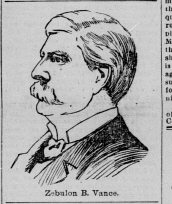Today on one of the blogs I follow in my feed reader, Southern Graves, there was a posting of the tombstone of North Carolina governor Zebulon Baird Vance. Upon reading the post I decided to do a little more reading about Zebulon, for even though I knew the name, I don’t know much about him. I commented on the blog post that the first time I knew anything about Zebulon was as a grad student at the University of North Carolina. The financial aid office is in Vance Hall, which is named after him. Someone obviously did not pay attention in her 8th grade North Carolina history class!
I did some online searching to see if I could locate an obituary for Zebulon, as I’m sure it must have been printed in many newspapers. Sure enough, I quickly found one in the Library of Congress’ Chronicling America newspaper collection. Here is an obit that appeared in the 15 Apr 1894 issue of the San Francisco Call newspaper.
 |
DIED FROM APOPLEXYWashington, Apr 14. — Senator Vance of North Carolina died at his home, 1726 Massachusetts avenue, this city, at 10:40 o’clock tonight. He had a stroke of apoplexy this morning. He had been suffering for some time from paralysis and a complication of diseases, but the end was sudden and unexpected, as he was regaining his health, and was thought to be on the road to recovery. He was compelled during the winter to leave the Senate and go to Florida. There he grew somewhat better, and in view of the struggle over the tariff returned to Washington. He was a member of the Committee on Finance, but took little or not part in framing the present tariff bill.
Zebulon Baird Vance was born in Buncomb [sic] County, North Carolina, May 13, 1830. He was educated at Washington College, Tennessee, and at the University of North Carolina, where he studied law. In 1852 he was admitted to the bar and established himself at Asheville, N.C., where was chosen County Solicitor, and in 1854 was elected to the Legislature. Vance was opposed to the secession of North Carolina, but after that step was taken he raised a company and soon afterward was appointed colonel of the Twenty-sixth North Carolina, a regiment that became the most famous organization of Southern soldiers. (read more at the Library of Congress website) |
The cities of Zebulon in Wake County & Vanceboro in Craven County are both named after him as well. His papers are held in the UNC Southern Historical Collection. Do you have any research connections with Zebulon or his family?